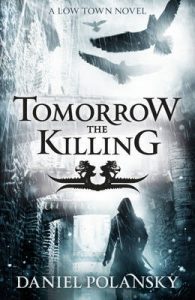Tomorrow the Killing by Daniel Polansky
 The Straight Razor Cure was a gritty and gripping introduction to the Low Town series. Tomorrow the Killing is even more impressive than its predecessor; it is dark and compelling and delves more deeply into Warden’s past, focusing particularly on his service during the Great War. This second instalment in the Low Town novels is set three years after the events of the first, and places a much greater emphasis on Warden’s attitude to the war: his voice comes across a lot more strongly and the overriding tone is one of grim cynicism, which is perfect for the purposes of the story.
The Straight Razor Cure was a gritty and gripping introduction to the Low Town series. Tomorrow the Killing is even more impressive than its predecessor; it is dark and compelling and delves more deeply into Warden’s past, focusing particularly on his service during the Great War. This second instalment in the Low Town novels is set three years after the events of the first, and places a much greater emphasis on Warden’s attitude to the war: his voice comes across a lot more strongly and the overriding tone is one of grim cynicism, which is perfect for the purposes of the story.
The characters – new and recurring – feel a lot more developed here, and I found myself liking (and hating) them a lot more than the characters in Razor. I felt revulsion towards the drug-addled crime lord Adisu the Damned, a mixture of anger and sympathy for war ‘hero’ Adolphus, derision and amusement at every appearance of the goons Roussel and Rabbit. The dialogue is sharp and witty, and Warden’s dry one-liners are a frequent source of humour. Most importantly, I began to understand the protagonist a little better. Tomorrow the Killing gives us a lot more to chew over in our attempts to understand Warden’s motives and attitudes, and it’s at this point where we start to experience an interesting mixture of sympathy and antipathy towards our anti-hero: antipathy, because the way he mishandles his relationships and deals with his problems is so different from how we imagine we would behave in his situation; sympathy, because we can totally understand why someone would react in such a way and how easy it would be to set foot on Warden’s downward spiral.
One of the shining aspects of Tomorrow the Killing is the way in which it deals with the impact of history upon the present day. Polansky draws on an issue that will always be relevant in any world, real or fictional, and presents several layers of conflict very cleverly. He has the Warden’s regret-tinged struggle to come to terms with his own participation in the war; Adolphus’ desperate attempts to regain glory for the veterans in spite of Warden’s opposing attitude; both men fighting to instil their respective attitudes on young Wren; and of course the general impossibility of reconciling the glorified speeches and broadsheet stories with the horrific experiences actually lived through by the soldiers. This is all done so well that we’re never sure whether either side is entirely right or wrong.
The plot is fast-paced and clever; Warden has stepped up his game in the time since the events of The Straight Razor Cure – perhaps because the new events are so close to home – and he tirelessly orchestrates schemes within plots within ideas, running circles around his adversaries (and other people who just happen to get in the way). Warden is revealed to be ruthless and more cunning than suggested by the previous novel, and the way Polansky manipulates events to their inevitable fiery yet poignant conclusion is tense, exciting and masterfully done.
